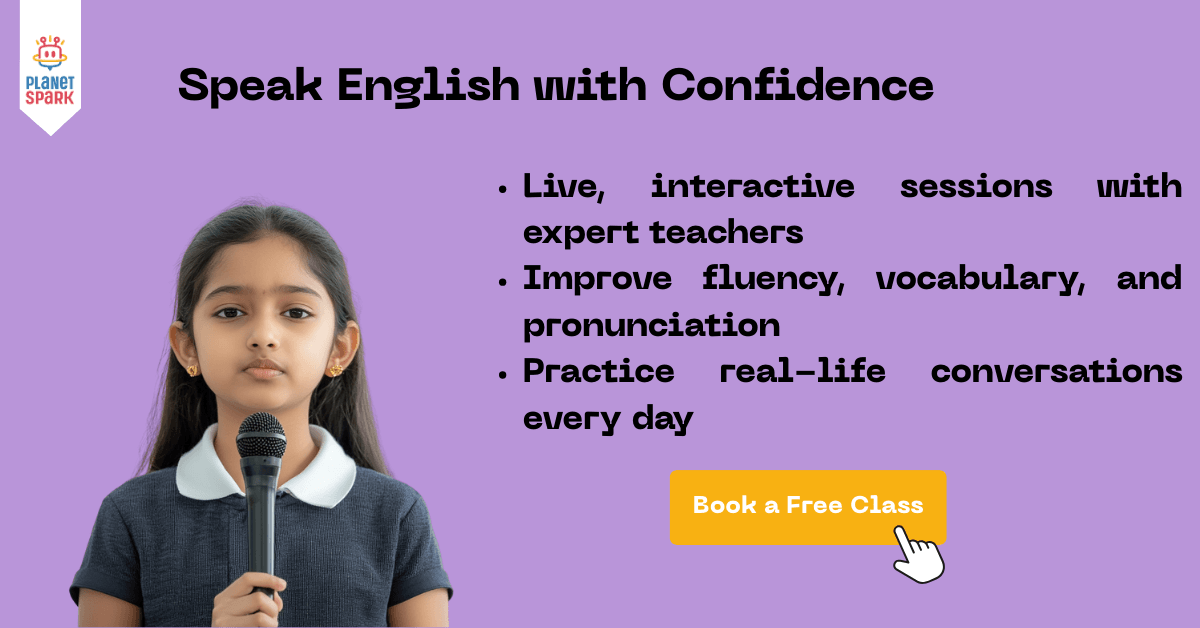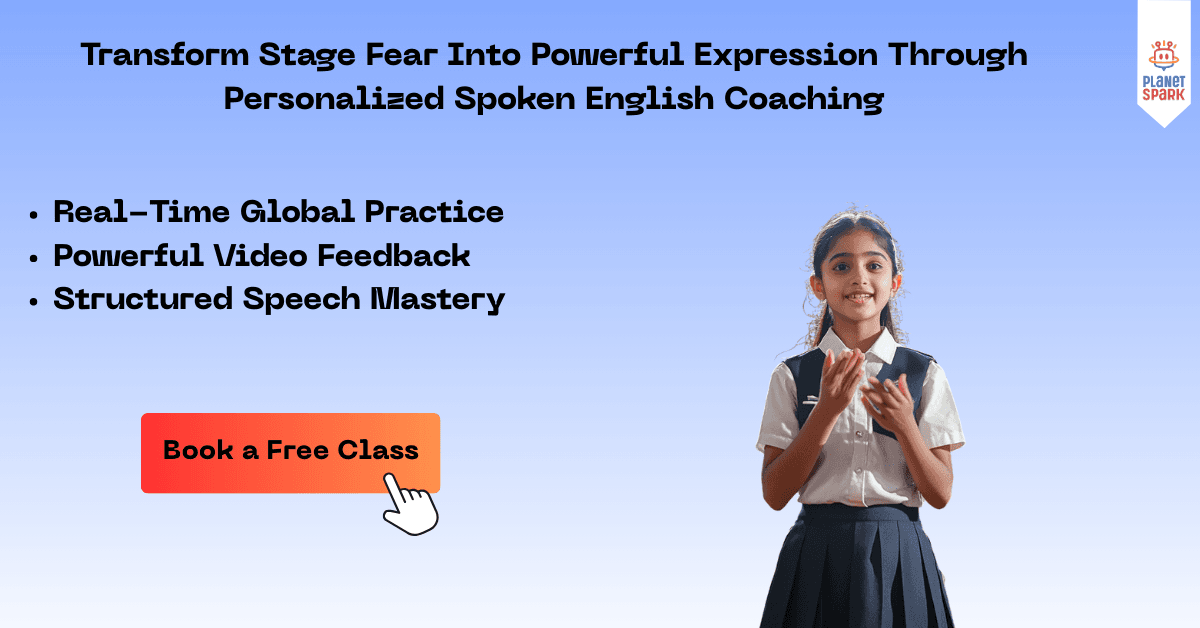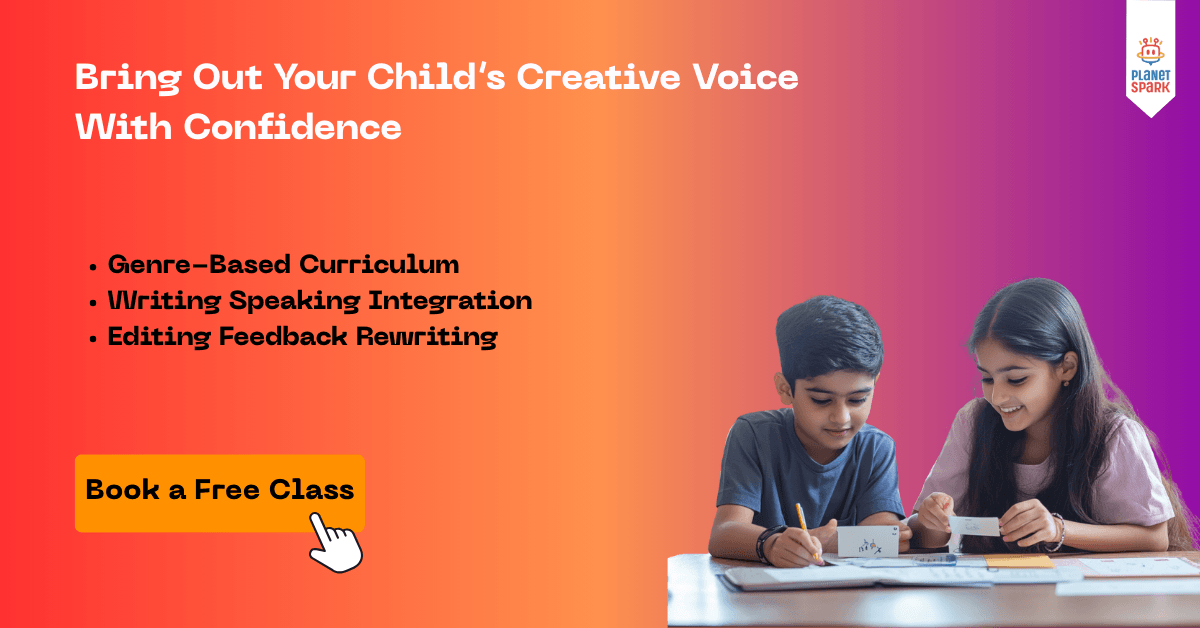English Exams for Kids in India – Olympiads, Certificates & Preparation
Last Updated At: 26 Sep 2025
12 min read

Table of Contents
- Categories of English Exams for Kids
- 1. Olympiad Exams (Competitive English Exams)
- 2. Certification Exams (Skill-based English Tests)
- 3. International English Tests
- Quick comparison of major English exams for kids in India
- How to Prepare for English Exams
- Tips for Kids
- Guidance for Parents
- Why Should Kids Take English Exams and Olympiads?
- Common Mistakes to Avoid in English Exams
- Benefits Beyond Academics
- How Parents Can Support Their Child
- Take Your Child’s English Skills Beyond Exams with PlanetSpa
- Frequently Asked Questions (FAQs)
English is one of the most important skills for children today. Schools, universities, and even careers place high value on strong English abilities. In India, many English exams and Olympiads are available for school students. These tests are designed to assess grammar, vocabulary, comprehension, writing, and communication skills while motivating children to aim higher.
Some exams are competitive Olympiads, where children compete at national or international levels. Others are certification exams, which provide globally recognized qualifications. A few are international tests, useful for benchmarking academic English.
This guide explains every major English exam for kids in India, including syllabus, eligibility, fees, exam process, rewards, preparation tips, FAQs, and a comparison table.

Categories of English Exams for Kids
1. Olympiad Exams (Competitive English Exams)
SOF International English Olympiad (IEO)
About the Exam: Organized by Science Olympiad Foundation, one of India’s most popular Olympiads. Designed to test grammar, comprehension, vocabulary, and usage.
Syllabus: Based on NCERT/CBSE/ICSE curriculum with extra focus on language application.
Eligibility: Students of Classes 1–12.
Exam Process: Objective-type questions. Higher classes have two levels.
Fees: Around ₹125 per student.
Rewards: Medals, merit certificates, scholarships for top performers.
Unified International English Olympiad (UIEO)
About the Exam: Conducted by Unified Council. Focuses on interactive and functional English.
Syllabus: Vocabulary, grammar, comprehension, and real-life communication.
Eligibility: Classes 1–10.
Exam Process: Objective paper, sometimes with higher levels.
Fees: Nominal registration fee.
Rewards: Cash awards, merit certificates, and recognition.
Book a Free Demo Class and see your child speak with confidence.
English International Olympiad (EIO - Indian Talent Olympiad)
About the Exam: National-level exam encouraging language skills in writing, grammar, and comprehension.
Syllabus: Grammar, reading comprehension, sentence building.
Eligibility: Classes 1–10.
Exam Process: Objective test, available offline and online.
Fees: Affordable per student.
Rewards: Prizes, medals, scholarships.
SilverZone International Olympiad of English (iOEL)
About the Exam: Conducted by SilverZone Foundation. Focuses on grammar, reading, writing, and vocabulary.
Syllabus: Class-wise curriculum with application-based questions.
Eligibility: Classes 1–12.
Exam Process: Two levels; written exam.
Fees: Registration fee per student.
Rewards: Scholarships, trophies, certificates.
CREST English Olympiad (CEO)
About the Exam: Online Olympiad with global reach. Tests academic and practical English.
Syllabus: Based on school curriculum, with communication-based skills.
Eligibility: Classes 1–10.
Exam Process: Online MCQ test.
Fees: Online registration fee.
Rewards: International recognition, medals, certificates.
Enroll your child today and build a strong foundation in English.
International Foundation English Olympiad (IFEO)
About the Exam: Global-level Olympiad focusing on grammar, comprehension, and vocabulary.
Syllabus: Class-specific, NCERT/ICSE/CBSE aligned.
Eligibility: Classes 1–12.
Exam Process: Online multiple-choice exam.
Fees: Small registration fee.
Rewards: Medals and certificates.
ASIAROPE English Olympiad
About the Exam: International Olympiad focusing on English and creative writing.
Syllabus: Grammar, comprehension, writing, journalism.
Eligibility: Classes 1–6 mainly, with higher levels in some years.
Exam Process: Application-based written exam.
Fees: Registration fee applies.
Rewards: International recognition, awards, and certificates.
2. Certification Exams (Skill-based English Tests)
Cambridge English Young Learners (YLE – Starters, Movers, Flyers)
About the Exam: Specially designed for young learners aged 7–12. Focuses on confidence in communication.
Syllabus: Listening, speaking, reading, writing in everyday life contexts.
Eligibility: Ages 7–12.
Exam Process: Fun, activity-based test; no pass or fail. Students earn “shields”.
Fees: Varies by test centre.
Rewards: Cambridge English certificate, recognized worldwide.
Cambridge English for Schools (KET, PET, FCE)
About the Exam: Advanced exams for teenagers, preparing them for academic and professional English.
Syllabus: Reading, writing, speaking, listening, grammar.
Eligibility: Teens aged 13–18.
Exam Process: Written and spoken components.
Fees: Depends on centre.
Rewards: Globally accepted certificate.
Pearson English International Certificate (Young Learners)
About the Exam: Tests English skills in line with CEFR (international standards). Focus on real communication.
Syllabus: Grammar, comprehension, speaking, listening, writing.
Eligibility: Children aged 6–13.
Exam Process: Interactive and level-based.
Fees: Centre-specific.
Rewards: Internationally recognized certificate from Pearson.
3. International English Tests
TOEFL Junior
About the Exam: Conducted by ETS, designed for ages 11–17. Good preparation for future TOEFL iBT.
Syllabus: Reading comprehension, listening, grammar, vocabulary in academic settings.
Eligibility: Middle and high school students (11–17 years).
Exam Process: Multiple-choice format at test centres.
Fees: Varies by country and centre.
Rewards: TOEFL Junior certificate, globally recognized.
Quick comparison of major English exams for kids in India
| Exam | Grades/Ages | Type | Mode | Fees | Rewards/Benefits |
|---|---|---|---|---|---|
| SOF IEO | 1–12 | Olympiad | Offline | ~₹125 | Medals, certificates, scholarships |
| UIEO | 1–10 | Olympiad | Offline | Nominal | Prizes, certificates |
| EIO (ITO) | 1–10 | Olympiad | Online/Offline | Affordable | Medals, scholarships |
| SilverZone iOEL | 1–12 | Olympiad | Offline | Standard fee | Scholarships, trophies |
| CREST CEO | 1–10 | Olympiad | Online | Online fee | Certificates, global recognition |
| IFEO | 1–12 | Olympiad | Online | Low fee | Medals, certificates |
| ASIAROPE | 1–6+ | Olympiad | Offline | Registration fee | Awards, recognition |
| Cambridge YLE | 7–12 yrs | Certification | Offline | Centre fee | Shields + certificate |
| Cambridge Schools (KET, PET, FCE) | 13–18 yrs | Certification | Offline | Centre fee | International certificate |
| Pearson Certificate | 6–13 yrs | Certification | Offline | Centre fee | Global certificate |
| TOEFL Junior | 11–17 yrs | International | Offline | Centre fee | Global benchmark certificate |
How to Prepare for English Exams
Tips for Kids
Practice Daily: Read storybooks, newspapers, and short passages.
Work on Vocabulary: Learn 5–10 new words daily and use them in sentences.
Grammar Exercises: Revise tenses, articles, prepositions, and sentence formation.
Sample Papers: Solve past papers and practice timed tests.
Speaking Practice: Talk in English at home or with friends to build confidence.

Guidance for Parents
Encourage Reading: Provide books, magazines, and age-appropriate novels.
Create a Routine: Set aside 20–30 minutes daily for English practice.
Support, Don’t Pressure: Motivate kids to enjoy the process rather than stressing about results.
Enroll in Courses: Consider online English courses that provide structured learning.
Track Progress: Use practice tests to measure improvement before the actual exam.
Why Should Kids Take English Exams and Olympiads?
English exams and Olympiads are more than just tests, they are opportunities for children to explore their potential.
Strengthen Core Skills: These exams focus on grammar, vocabulary, comprehension, and writing, which form the base of communication.
Build Confidence: Performing in a competitive environment boosts self-belief and helps children overcome stage fear or hesitation in using English.
National and International Exposure: Kids compete with peers from across the country and abroad, which widens their perspective and prepares them for global standards.
Scholarships and Recognition: Many exams reward top performers with scholarships, cash prizes, and medals that boost a child’s academic profile.
Future Readiness: Early exposure to structured exams builds a foundation for advanced competitive tests, interviews, and academic pursuits.
Book a Free Demo Class and see your child speak with confidence.
Common Mistakes to Avoid in English Exams
Even bright students often make mistakes because they don’t approach the exam strategically.
Not Reading Instructions Carefully: Children sometimes jump straight into answering, missing key points in the instructions.
Focusing Too Narrowly: Some students only revise grammar rules but skip practice in comprehension or writing tasks.
Ignoring Time Management: Spending too much time on one question leaves less time for others, even if they are easy.
Rote Learning Instead of Understanding: Memorizing definitions or answers may not help if the question is framed differently.
Skipping Revision: Many students forget to check their answers at the end, leading to avoidable mistakes.
Benefits Beyond Academics
English exams are not only about marks and certificates. They also help in overall personality development.
Improves Thinking Ability: Sections like comprehension and reasoning encourage logical and critical thinking.
Encourages Creativity: Some exams include writing tasks that push children to think imaginatively and express ideas clearly.
Sharpens Problem-Solving: Time-bound tests train children to analyze situations and decide quickly.
Boosts Profile for Admissions: Certificates and medals add weight to a child’s school or college applications, especially for international programs.
Life Skills: Skills like communication, confidence, and analytical thinking help children well beyond academics.
How Parents Can Support Their Child
Parents play a vital role in making exam preparation stress-free and effective.
Provide a Learning-Friendly Environment: A quiet, distraction-free space helps children focus.
Encourage Reading Habits: Reading storybooks, newspapers, or magazines daily exposes kids to new words and ideas.
Help With Planning: Create a timetable that balances schoolwork, exam prep, and playtime to avoid stress.
Offer Practice Resources: Give children access to sample papers, worksheets, and mock tests for regular practice.
Be Supportive and Motivating: Praise effort, not just results. Avoid pressuring kids to "win"—instead, encourage them to enjoy learning.
Stay Involved: Track progress, discuss doubts, and celebrate small achievements to keep kids motivated.
English exams for kids in India provide more than just marks—they help build confidence, communication skills, and future opportunities. From Olympiads that encourage competition, to Certification exams that provide global recognition, and International tests that prepare kids for higher education abroad, there is something for every child.
Parents and children should choose an exam based on goals, age, and interest, then prepare step by step using books, sample papers, and consistent practice.

Take Your Child’s English Skills Beyond Exams with PlanetSpark
English exams and Olympiads help children test their knowledge, but true mastery comes from regular practice and real-world application. This is where the PlanetSpark Spoken English Course becomes the perfect next step. It doesn’t just prepare kids for tests, it helps them communicate with confidence in every situation.
At PlanetSpark, children learn English in a fun, interactive, and structured way. The program is designed to make kids not only exam-ready but also life-ready.
Why Choose PlanetSpark’s Spoken English Course?
Live Interactive Classes: Kids learn in small groups or 1:1 sessions with expert mentors.
Activity-Based Learning: Role plays, debates, and storytelling help children use English naturally.
Structured Curriculum: Covers grammar, vocabulary, fluency, and public speaking step by step.
Confidence Building: Focus on speaking skills that reduce hesitation and stage fear.
Personalized Feedback: Every child gets guidance tailored to their strengths and improvement areas.
Global Exposure: Interaction with peers across countries builds international-level communication skills.
The PlanetSpark Advantage
A balance of fun + learning, so kids never feel pressured.
Courses designed for children from beginner to advanced levels.
Certificates that add value to your child’s academic portfolio.
A proven record of helping thousands of kids transform into confident speakers.
Frequently Asked Questions (FAQs)
Q1. Which English exam is best for kids in India?
It depends on the goal. Olympiads like SOF IEO test competitive skills, while Cambridge and Pearson exams provide international certification.
Q2. Do these exams help in academics?
Yes, they improve grammar, vocabulary, comprehension, and writing, which reflect in school performance.
Q3. Are these exams compulsory?
No, all are optional. Parents can choose based on the child’s interest and goals.
Q4. What is the benefit of international certifications?
They are recognized worldwide and helpful for future studies, exchange programs, and confidence building.
Q5. How often are these exams conducted?
Most Olympiads are annual. Certification exams like Cambridge and Pearson are conducted multiple times a year at authorized centres.
Q6. Can children prepare without coaching?
Yes, with regular reading, practice papers, and parental guidance, kids can prepare on their own.
7. What is the right age for children to start taking English Olympiads?
Most English Olympiads are open from Class 1 onwards. However, the right age depends on the child’s interest and confidence. Starting early helps build exam experience gradually.
8. Do these exams follow the school curriculum?
Yes, most Olympiads are designed around NCERT, CBSE, ICSE, and state boards. They may also include slightly advanced questions to test application and reasoning.
9. How many levels do English Olympiads usually have?
Most exams have two levels. Level 1 is for all participants, while Level 2 is for top scorers from the first round. Some exams are single-level but equally competitive.
10. Are these exams online or offline?
It depends on the organization. Some like CREST conduct online exams, while SOF and SilverZone usually conduct them offline through schools. A few offer both options.
11. How can I register my child for these exams?
Registration is usually done through schools. Some exams also allow individual registration online via the official websites.
12. Do English Olympiads provide scholarships or prizes?
Yes. Many Olympiads offer medals, cash prizes, certificates, or even scholarships for top performers at school, zonal, and international levels.
13. Are these exams only for toppers, or can average students participate?
These exams are open for all. Even average students benefit from the exposure, practice, and confidence they gain. Participation itself is a valuable experience.
14. How much time should a child spend preparing for English Olympiads?
Regular practice of 20–30 minutes daily is more effective than last-minute cramming. The focus should be on reading, grammar exercises, and mock tests.
15. Can kids prepare for these exams without coaching?
Yes. With the right books, sample papers, and parental support, children can prepare at home. Coaching is optional and only needed if parents feel the child needs extra guidance.
16. What skills do these exams test apart from English language knowledge?
They also test comprehension, reasoning, logical thinking, creativity, and problem-solving abilities—all of which are essential life skills.
17. Are these certificates useful for higher education?
Yes. While they don’t guarantee admission, Olympiad certificates strengthen a child’s profile for school awards, scholarships, and future applications, especially abroad.
18. Do schools encourage participation in these exams?
Most schools support Olympiads and may even act as exam centers. Teachers often recommend these exams to help children improve their academic and competitive edge.
Personalized Communication Report
Record a video to get a AI generated personalized communication report for your child
Select Learner's Class

Hi There, want to try these
tips for your child with
LIVE with our expert coach?
Let's check your child's
English fluency
